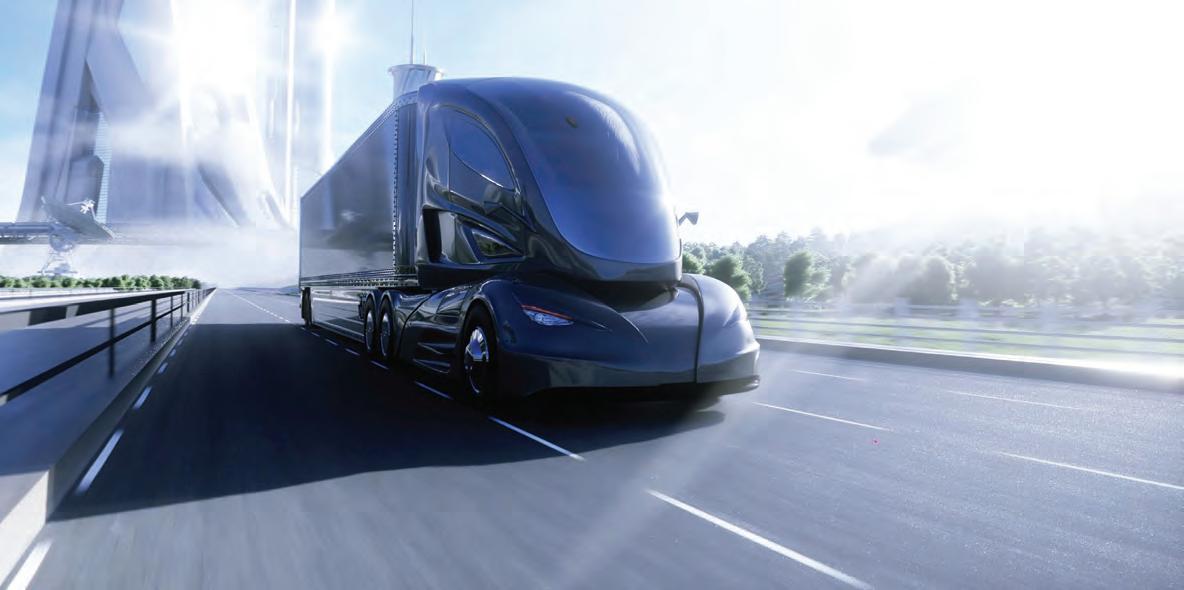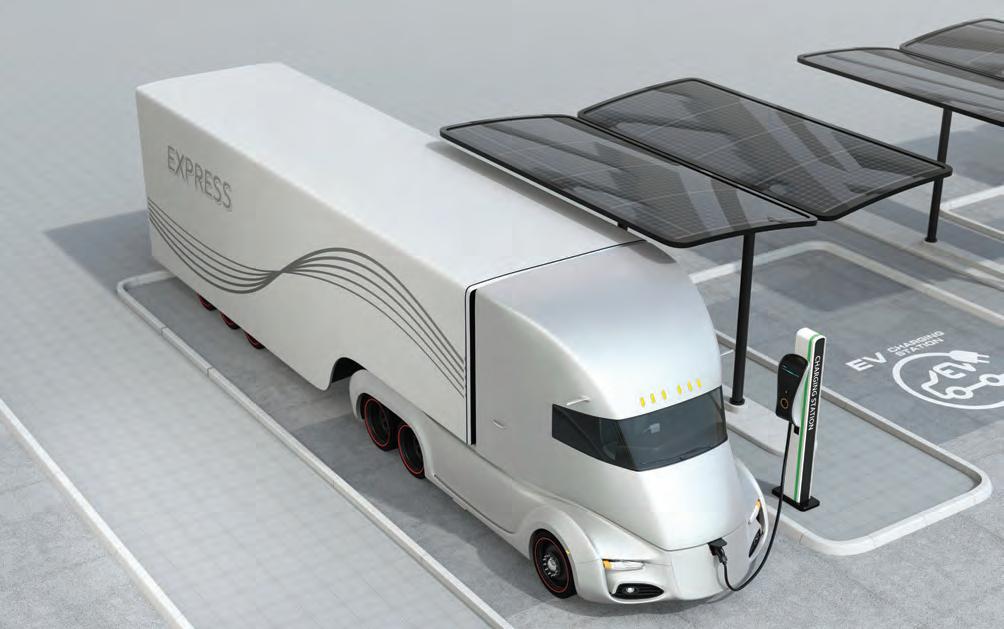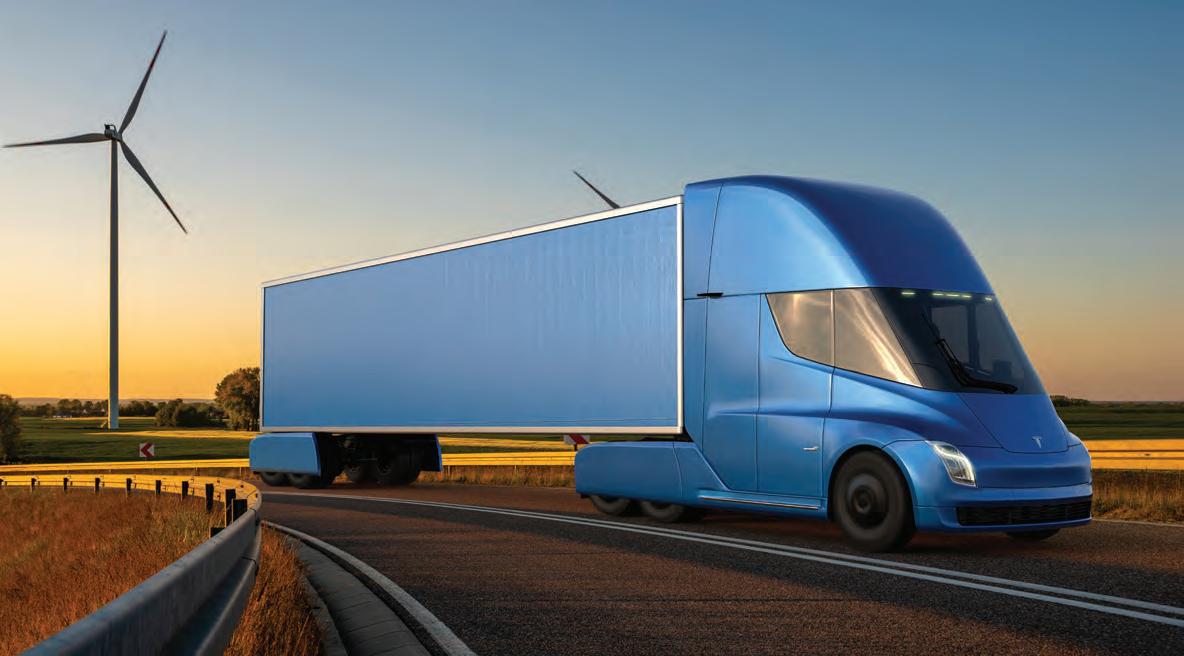
9 minute read
ELECTRIFICATION
from Global Trailer 63
by Prime Group
TOGETHER IN ELECTRIC
DREAMS
THE ELECTRIFICATION OF COMMERCIAL VEHICLES IN AUSTRALIA IS FINALLY GAINING MOMENTUM.
Corporate responsibility is a key driver for the rollout of allelectric commercial vehicles. It certainly is for national courier, Australia Post, which in November last year, welcomed the first of 20 electric trucks into its fleet. The remaining 17 trucks on order should hit the streets, delivering in major capital cities, from early 2022. The rollout of the new vehicles will be supported by Australia Post Fleet Management Provider SG Fleet.
Australia Post has an existing delivery fleet of over 2,100 electric delivery vehicles and 1400 electric bicycles.
The introduction of Fuso eCanters is reported to follow a successful trial of the Daimler developed truck in late 2019.
Australia Post General Manager Networks, James Dixon, said the addition of the Fuso eCanter to Australia Post’s delivery fleet was an exciting step for the organisation.
“We’re very proud to be Australia’s largest electric fleet operator, but up until
“WE’VE TRIALLED A RANGE OF ELECTRIC TRUCKS PREVIOUSLY, BUT THE FUSO ECANTER IS THE FIRST WE’VE FOUND THAT SUITS BOTH AUSTRALIAN CONDITIONS AND OUR UNIQUE OPERATIONAL NEEDS.” James Dixon Australia Post, General Manager Networks this point, our electric fleet has consisted solely of smaller delivery vehicles that are used for the last mile,” he said. “We’ve trialled a range of electric trucks previously, but the Fuso eCanter is the first we’ve found that suits both Australian conditions and our unique operational
needs,” said Dixon.
Australia Post Chief Sustainability Officer, Susan Mizrahi, said expanding the current electric fleet was an important part of the Australia Post’s 2020-22 Corporate Responsibility plan and its science-based target to reduce emission by 15 per cent by 2025.
“This is an important milestone for our business,” said Mizrahi. “We know that every delivery has a carbon footprint which is why we’re committed to reducing our emissions through growing our electric fleet and increasing our renewable energy production to help power these new vehicles.”
The Fuso eCanter is reported to be the only Original Equipment Manufacturer (OEM) electric truck available in Australia and uses the latest technology from the Daimler Truck group.
Daniel Whitehead, President and CEO of Daimler Truck and Bus Australia Pacific, said Australia Post was the perfect first Australian customer for the eCanter.
“Daimler is thrilled to partner with such an iconic brand as Australia Post on a journey towards carbon neutral freight transportation in Australia,” he said.
Is it inevitable for other fleets to follow suit when it comes to the acquisition of diesel-alternative-powered trucks? For Mining Resources, a prominent mining company, it took delivery of a SEA 300-85 from global e-mobility technology company, SEA Electric, last October. This was celebrated by the manufacturer as a win, the first Australian produced all-electric truck to leave its production line. The vehicle currently travels along the Western Australia road network.
Constructed from a Semi Knocked Down (SKD) kit at SEA Electric’s Melbourne facility, the truck was finished with the latest SEA Electric badging and branding, complete with its own compliance plate and full factory warranty.
Rated to 8.5-tonnes, the SEA 300-85 is specified with a 138kWh battery driving a 1,500Nm motor, which lends itself to a variety of final applications, including dry freight, temperature-controlled freight, as an elevated working platform or a tipper for municipal use in a range of trims.
Unladen, the combination has a potential range of up to 300km.
For Mineral Resources, the addition of an all-electric truck to its vehicle fleet is a strong demonstration of the company’s commitment to net-zero emissions. The company’s Chief Executive of Mining Services, Mike Grey, said the firm is committed to a low-carbon future and is working to reduce its greenhouse gas emissions.
“Our mission is to grow our mining services and operations responsibly and across our business,” he said. “We are finding ways to reduce our carbon emissions through improving fuel efficiency and optimising our logistics – transport offers us a great opportunity in this regard.”
The rollout of electric vehicles will be challenged by access to charging points and related infrastructure.

Alternative fuel technologies are changing the road transport game worldwide.
Since 2017, SEA Electric has been performing driveline swaps on existing internal combustion engine powered trucks, which has perfected the technology, including the patented SEA-Drive Power System.
The move to construct from new on a production line by SEA Electric sees the process become much more efficient, with the trucks prepared quicker, cheaper and with less waste.
It is also noteworthy that SEA Electric is currently replicating the production techniques developed locally in Australia for other markets worldwide.
The SEA 300-85 is just one example of the first full range of pure-electric trucks available globally, with options covering from 4.5-tonne car licence through to 22.5-tonne three-axle rigids.
Developments overseas may in time take root in our domestic market.
Hydrogen and electric commercial vehicle maker, Giga Carbon Neutrality (GCN), is set to launch a comprehensive range of vehicles that it plans to bring to market over the next two years. GCN will launch 21 different battery-electric and hydrogen fuel-cell powered vehicles by the end of 2023, the Chinese company said in a statement.
The portfolio is configurable to a wide range of commercial use cases and includes a tractor unit, buses and last mile logistics vehicles.
At present, the company’s first prototype hydrogen-fuelled tractor unit is undergoing advanced road and usability trials in China.
GCN designs its vehicles at a state-of-the-art research and development centre located in Hangzhou, China.nIts international headquarters are located in London.
It is understood GCN has developed its own proprietary hydrogen fuel-cell technology and will initially source batteries from leading manufacturers.
The GCN vehicles are manufactured using lightweight stainless steel and composite materials to improve safety and deliver reductions in weight and energy consumption of at least ten per cent.
The bodies of GCN vehicles are designed to last for 20 years, significantly longer than vehicles from other providers on the market the manufacturer claimed.
GCN is working with public and private sector partners to provide clean energy storage, charging and refuelling infrastructure, as well as specialist financing to support the adoption of what it refers to as its zeroemission commercial vehicles globally.
“We are thrilled to give the world its first look at the future of zero-emission commercial transportation,” said Giga Carbon Neutrality CEO, Marty Wade.
“GCN is enabling a carbon-neutral future for some of the world’s most energy-intensive industries, with clean energy vehicles, new technologies and a fuelling ecosystem to make

running clean, reliable vehicle fleets easy for commercial transportation companies.”
The company’s initial range includes a 44-tonne rated hydrogen fuel-cell truck with a top speed of 90 kph and 580 km range before refuelling; a 12-metre transit bus for urban public transport capable of carrying up to 95 passengers; the 6.9 metre GCN Pure Electric Minibus with an ultra-long wheelbase and flat floor structure to provide capacity for up to 13 passengers; and an 8-tonne battery-electric truck to support last mile logistics in urban and rural areas currently known as the GCN Electric Logistics Vehicle.
Partners of GCN include Silk Road Group, Chasun, China Union Pay, UMS Express and State-owned automobile company Chery.
Australia’s trucking industry is proving to be as dynamic as ever with a variety of new vehicles set to enter the market in the near future. Following the uptake of battery electric vehicles across a range of sectors it makes sense that workshops across the country will be exploring opportunities to upskill personnel and maintain pace with electrification trends.
Last year, TAFE Queensland opened a Heavy Plant Centre of Excellence to provide industry relevant electronic and battery operated vehicles and machinery training in response to these emerging technologies.
TAFE Queensland Heavy Vehicle Industries Business Manager, Geoff Tillett, said the training provider is pioneering to deliver the training that industry needs to service and repair hybrid electric vehicles and battery electric vehicles and machinery entering Australia at an increasing volume.
“As a result of this increase comes the risk of having unskilled and unqualified people within this industry working on high voltage and high amperage battery electric vehicles,” said Tillett.
“The skills and knowledge learnt at our new Heavy Plant Centre of Excellence will be essential to complete work on electronic and battery-operated vehicles and machinery to the highest safety and service standards.
“TAFE Queensland aims to ensure industry is safe when it comes to working on new electronic and battery-operated vehicles and “TAFE QUEENSLAND AIMS TO ENSURE INDUSTRY IS SAFE WHEN IT COMES TO WORKING ON NEW ELECTRONIC AND BATTERYOPERATED VEHICLES AND MACHINERY AND TO ENSURE OUR EMPLOYERS AND APPRENTICES HAVE BOTH THE CURRENT AND CONTEXTUALISED TRAINING THEY REQUIRE.”
Geoff Tillett TAFE Queensland, Heavy Vehicle Industries Business Manager
machinery and to ensure our employers and apprentices have both the current and contextualised training they require.”
Tillett said TAFE Queensland has been providing industry standard training across the hybrid electronic light vehicles sector for over a decade.
“The new training facility will enable training to now extend further to support heavy commercial vehicles, mobile plant technology, civil construction, mining, transport and logistics sectors,” he said. “The centre will also offer specialised training on electronic propulsion and integrated hydraulic systems in mobile plant and road transport as well as the high-end diagnostic capabilities that are going be required well into the future.”
As TAFE Queensland expands its capabilities to support the electronic and battery-operated vehicles and machinery sector, partnerships have already been formed with key industry organisations to ensure all training remains consistent and up to date as new technologies continue to evolve.
One of these partners, global aftermarket parts and automotive supplies provider, DANA Australia will work with TAFE Queensland to supply ongoing resources, training and support. The company has already made plans to provide two sets of Dana TM4 SUMO motors and CO150 inverters, which are used on the Sandvik Artisan A18 battery-electric loader.
Dana Australia Managing Director, Nick Stavrakis, said the company is pleased to have the opportunity to partner with TAFE Queensland to customise training to meet the unique needs of these important future career paths.
“Dana offers a full suite of electrified technologies for off-highway equipment and we understand that the technicians of the future will require training to ensure they can safely manage the maintenance activities for these vehicles,” he said.
A featured course delivered from the new facility is the Safely Depower and Reinitialise Hybrid Vehicle Skill Set (SSAUR001). The course is designed to provide updated electronic and battery electric vehicles skills relevant across the light automotive, heavy commercial vehicles, mobile plant technology, civil construction, mining and transport and logistics industries.
The skill set provides existing workers key skills including the main components of hybrid battery electrics vehicles, how to safely isolate high voltage (HV) rechargeable energy storage systems (RESS), and how to reinitialise energy storage systems and safely reinitialise a hybrid electric vehicle.










